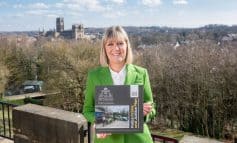Councillors will hear about considerable progress being made towards a more sustainable future, as carbon emission reduction efforts in County Durham reach new heights.
Durham County Council’s cabinet will be presented with an update on the authority’s Climate Emergency Response Plan, which highlights the continued fall in council carbon emissions from its own buildings and activities, alongside the considerable work done to support residents, businesses and community organisations in the transition to a low carbon future.
Cllr Mark Wilkes, Durham County Council’s cabinet member for neighbourhoods and climate change, said: “Since the implementation of our latest Climate Emergency Response Plan, we have made considerable progress towards achieving our goal of being a net zero council by 2030, which is testament to the hard work and ingenuity of the council and its partners.
“Climate change has the potential to cause catastrophic problems for generations to come.
“It is important that we look at and address the issues in our area, to reduce our contribution to this international crisis.
“As well as reducing our carbon emissions, the work carried out will cut costs for the council.
“While we have plenty to build on here, we recognise that there is much more to be done so this report to cabinet will also set out how our future planning and projects will be further strengthened to meet the opportunities and challenges that are ahead.”
The report highlights a further five percent reduction in the council’s carbon emissions in 2022/23, meaning a 59 per cent reduction in total, from levels in 2008/09.
Across the wider county for households, transport and businesses, although emissions increased slightly in 2021 following a return from the covid lockdowns of 2020, there was still a 52 per cent reduction in total (from a 1990 baseline), an improvement on pre-covid levels of 50 per cent.
Key to the success has been progress with a range of projects detailed in the plan.
The work of the council gained attention from the Government’s Climate Change Committee, which, under the chairmanship of Lord Deben, visited the county earlier in the year to see first-hand the range of work underway.
Further national recognition was gained after the council was named a finalist in the Association of Public Service Excellence Awards, in the Best Climate Action and Decarbonisation Initiative category.
The success of these projects, together with community and staff engagement, have contributed to achieving the top ranking “Green” in the national quality standard Investors in Environment.








